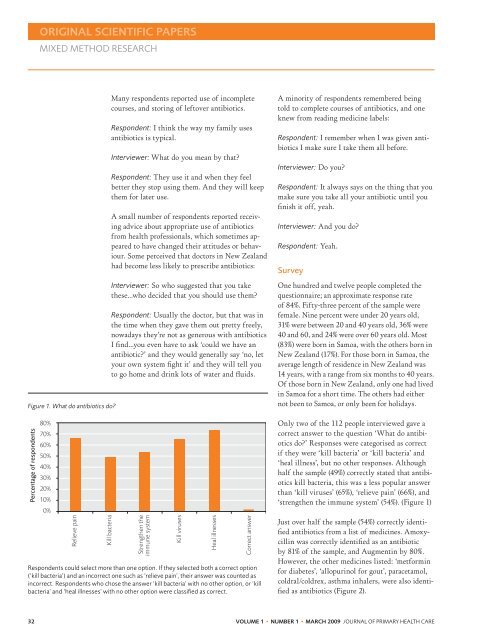entire issue. - The Royal New Zealand College of General ...
entire issue. - The Royal New Zealand College of General ...
entire issue. - The Royal New Zealand College of General ...
Create successful ePaper yourself
Turn your PDF publications into a flip-book with our unique Google optimized e-Paper software.
ORIGINAL SCIENTIFIC PAPERS<br />
MIXED METHOD RESEARCH<br />
Figure 1. What do antibiotics do?<br />
Many respondents reported use <strong>of</strong> incomplete<br />
courses, and storing <strong>of</strong> leftover antibiotics.<br />
Respondent: I think the way my family uses<br />
antibiotics is typical.<br />
Interviewer: What do you mean by that?<br />
Respondent: <strong>The</strong>y use it and when they feel<br />
better they stop using them. And they will keep<br />
them for later use.<br />
A small number <strong>of</strong> respondents reported receiving<br />
advice about appropriate use <strong>of</strong> antibiotics<br />
from health pr<strong>of</strong>essionals, which sometimes appeared<br />
to have changed their attitudes or behaviour.<br />
Some perceived that doctors in <strong>New</strong> <strong>Zealand</strong><br />
had become less likely to prescribe antibiotics:<br />
Interviewer: So who suggested that you take<br />
these…who decided that you should use them?<br />
Respondent: Usually the doctor, but that was in<br />
the time when they gave them out pretty freely,<br />
nowadays they’re not as generous with antibiotics<br />
I find…you even have to ask ‘could we have an<br />
antibiotic?’ and they would generally say ‘no, let<br />
your own system fight it’ and they will tell you<br />
to go home and drink lots <strong>of</strong> water and fluids.<br />
Respondents could select more than one option. If they selected both a correct option<br />
(‘kill bacteria’) and an incorrect one such as ‘relieve pain’, their answer was counted as<br />
incorrect. Respondents who chose the answer ‘kill bacteria’ with no other option, or ‘kill<br />
bacteria’ and ‘heal illnesses’ with no other option were classified as correct.<br />
A minority <strong>of</strong> respondents remembered being<br />
told to complete courses <strong>of</strong> antibiotics, and one<br />
knew from reading medicine labels:<br />
Respondent: I remember when I was given antibiotics<br />
I make sure I take them all before.<br />
Interviewer: Do you?<br />
Respondent: It always says on the thing that you<br />
make sure you take all your antibiotic until you<br />
finish it <strong>of</strong>f, yeah.<br />
Interviewer: And you do?<br />
Respondent: Yeah.<br />
Survey<br />
One hundred and twelve people completed the<br />
questionnaire; an approximate response rate<br />
<strong>of</strong> 84%. Fifty-three percent <strong>of</strong> the sample were<br />
female. Nine percent were under 20 years old,<br />
31% were between 20 and 40 years old, 36% were<br />
40 and 60, and 24% were over 60 years old. Most<br />
(83%) were born in Samoa, with the others born in<br />
<strong>New</strong> <strong>Zealand</strong> (17%). For those born in Samoa, the<br />
average length <strong>of</strong> residence in <strong>New</strong> <strong>Zealand</strong> was<br />
14 years, with a range from six months to 40 years.<br />
Of those born in <strong>New</strong> <strong>Zealand</strong>, only one had lived<br />
in Samoa for a short time. <strong>The</strong> others had either<br />
not been to Samoa, or only been for holidays.<br />
Only two <strong>of</strong> the 112 people interviewed gave a<br />
correct answer to the question ‘What do antibiotics<br />
do?’ Responses were categorised as correct<br />
if they were ‘kill bacteria’ or ‘kill bacteria’ and<br />
‘heal illness’, but no other responses. Although<br />
half the sample (49%) correctly stated that antibiotics<br />
kill bacteria, this was a less popular answer<br />
than ‘kill viruses’ (65%), ‘relieve pain’ (66%), and<br />
‘strengthen the immune system’ (54%). (Figure 1)<br />
Just over half the sample (54%) correctly identified<br />
antibiotics from a list <strong>of</strong> medicines. Amoxycillin<br />
was correctly identified as an antibiotic<br />
by 81% <strong>of</strong> the sample, and Augmentin by 80%.<br />
However, the other medicines listed: ‘metformin<br />
for diabetes’, ‘allopurinol for gout’, paracetamol,<br />
coldral/coldrex, asthma inhalers, were also identified<br />
as antibiotics (Figure 2).<br />
32 VOLUME 1 • NUMBER 1 • MARCH 2009 J OURNAL OF PRIMARY HEALTH CARE

















